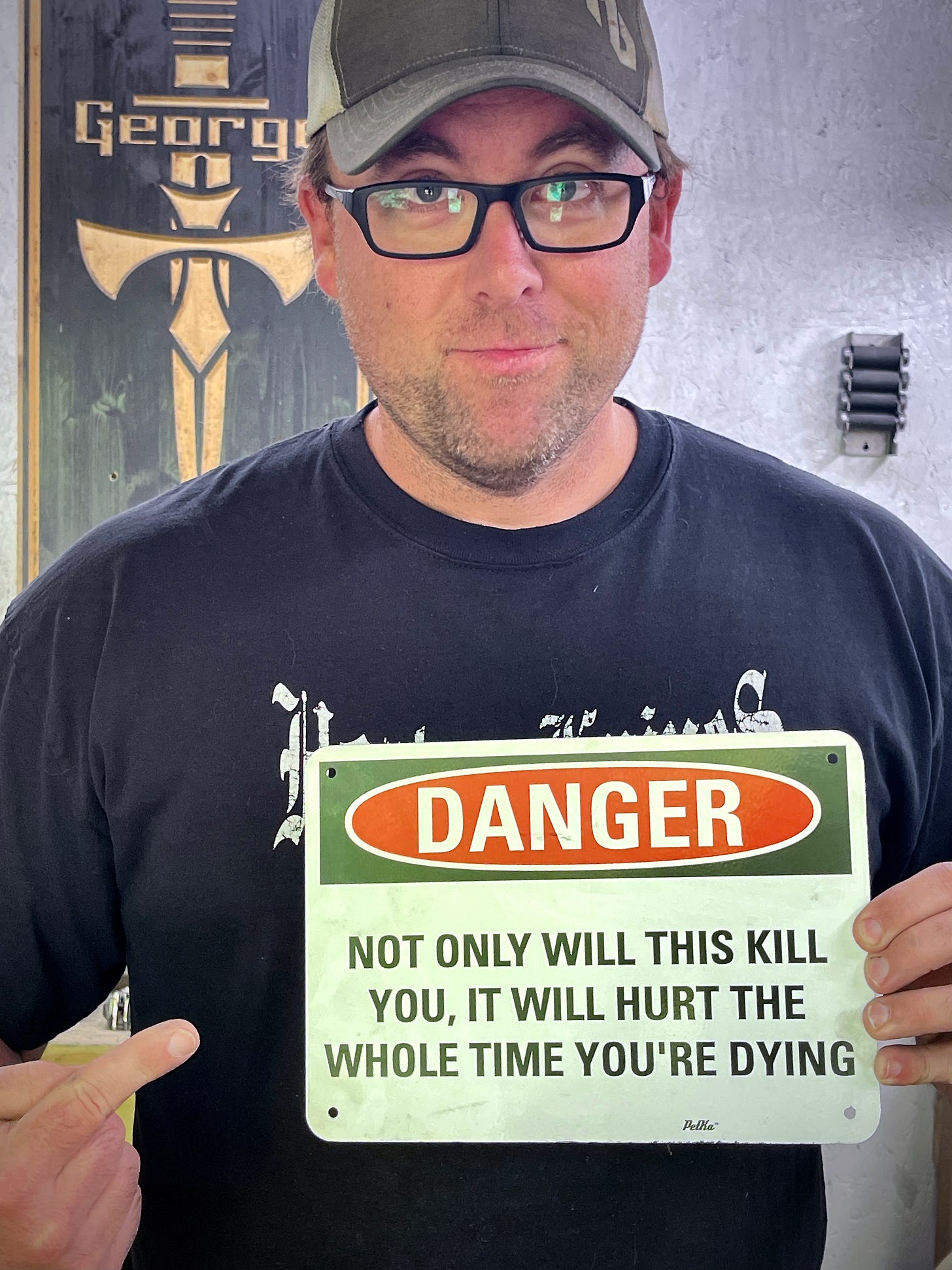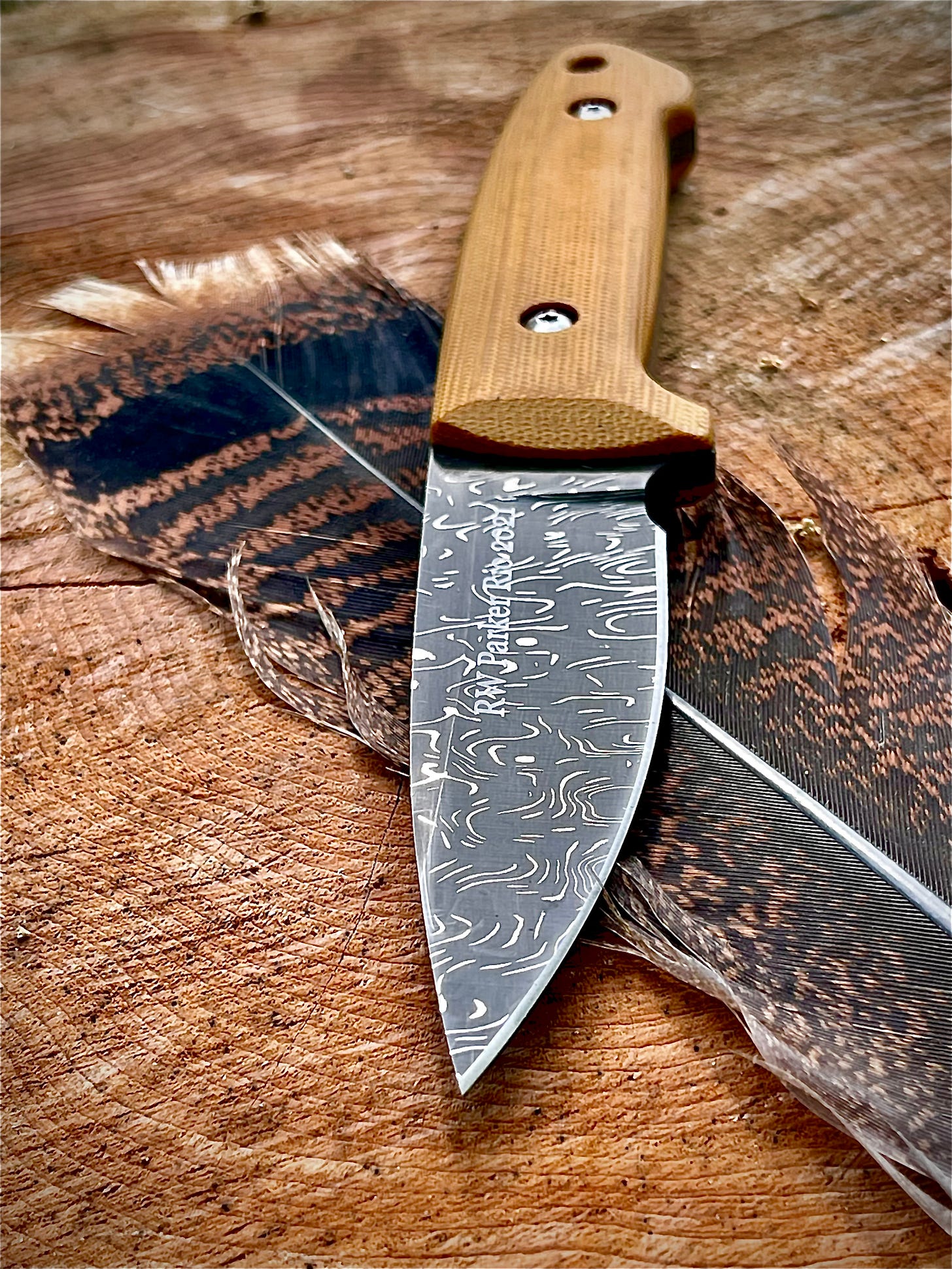Thoughts from a Vetrepreneur: Les George of George Knives and Defiant7
Vet·tre·pre·neur(vettrəprəˌno͝or): a military veteran who organizes and operates a business or businesses, taking on greater than normal financial and personal risks to do so.
Les George is the funniest man in the knife business. He’s also one of the most talented, selling knives faster than he can make them. He started when he was twelve, grinding a knife made from a circular saw blade by hand using a file. Since then, he’s become the go-to knife maker for a legion of obsessive fans and the go-to knife designer for some of the biggest names in the industry. Under his watchful eyes, I made a knife with him that I carry regularly. If Les George can teach me to make a knife and keep all my fingers, you know he’s good.
- Russell Worth Parker, Editor in Chief, Lethal Minds Journal
Who are you, what is your military service background, what is your business, and why/how did it come to be ?
I was born at a very young age in Wichita, Kansas. I enlisted in the Marines in 1997, during my Senior year of high school. My first Military Operational Specialty (MOS) was as a heavy equipment mechanic (1341), and my first unit was an air wing unit on Camp Pendleton with no heavy equipment. So I got out of there as fast as I could by volunteering for Marine Security Guard (MSG) duty and was sent to the embassies in Maputo, Mozambique, and Bridgetown, Barbados. As I was about to rotate off MSG duty, I had the choice of going back to be a mechanic in the fleet as a Sergeant with zero MOS knowledge, or find a new MOS. It turns out EOD is an MOS full of Sergeants that have zero MOS knowledge, so I made that jump. I also was a fan of blowing stuff up, so it all came together nicely. I went to EOD school, then a year in Camp Fuji Japan, then to Kaneohe Bay, Hawaii. From Hawaii, I traveled a lot, Thailand, Okinawa, Laos, Fuji (again), and Iraq. After that, with just over ten years in, a little short of my thirtieth birthday, I got out to grow my hair and chase the dream. All pretty standard stuff.
I got out and took an Unexploded Ordnance contract, doing standard UXO remediation work. It’s super easy work, but it was hot in Alabama in August, and working a civilian job was boring, so I finished that very short contract and went back to my house in Texas and started trying to make knives full-time. I had made knives pretty seriously in high school, but stopped when I enlisted. I started getting the itch again in Hawaii and hooked up with a world-class knife maker named Stan Fujisaka (RIP) who turned out to live three miles away from me in Hawaii. I spent a lot of Saturdays in his shop, being taught how to not be a hack, and at least 15% of it stuck.
What did you know about business generally, and yours specifically, before starting one?
I left that UXO job and decided, “Screw it, I’ll be a knifemaker until I have to go back to UXO,” and so far, I have not had to go back, and Lord willing I never will. That was the extent of my business plan and probably over exaggerates what I knew about business practices and procedures. Being too stupid to quit is a lifelong theme I have honed to a fine edge.
Can you explain your lines of business? Ultimately, you’re a one-man show. What gave you the confidence to go all in on yourself, and was that anxiety-inducing?
Well, I am not so much a one-man show these days. I was truly wearing every hat for a dozen years, but I hired my first employee about three years ago, at George Knives. My production company, Defiant7, has shop employees, a sales guy, and a partner.
So, with George Knives, obviously, I make knives. From semi-production stuff termed as “Mid Tech” to full one-off custom knives for thousands of dollars. On top of that, I license design work to production companies. I have done work with Kershaw, ZT, Pro-Tech, Spartan Blades, Ka-Bar, Boker, Fox, and MKM in Italy. The coolest part of the production collaborations is that I get to be involved in the knife business at every level, from $8,000 customs to $30 knives on Amazon.
With Defiant7, I am the production company, and we make some of my designs. Since most of my friends are world-class knifemakers, I got them to license me designs from Defiant7, and we are running that thing like a rock and roll super band from the 2000s.
I didn’t exactly burn the boats behind me, though. I always knew that I could have a UXO job with a phone call and an 8-hour HAZWOPER refresher class. Even after all these years, I could still get back to that, if things fell apart. Even with that safety net, I have been all in on knives for so long that even if I burn out a little and think about doing something else, there is nothing else that I see that I could really put my interest in like I have with knives.
What would you do differently?
HAHAHAHA, so many things! I honestly played it pretty safe in business for a lot of years. One day, I just decided to stop that and really put my foot into it. My business has grown exponentially since then. I don’t like to take chances, but I am not scared of a risk at all. My EOD interview taught me the difference: a risk is calculated and considered, and weighed out. All the controls to leave you on top are brought in, and you can take that measured risk. A “chance” has none of that taken into account; getting drunk and shooting a gun straight up into the air offers a chance that it will come down and kill you (and it’s reckless according to unrelated court documents).
What has been your biggest challenge thus far?
Management. Of time, resources, and people. When I started, I was going to work as hard as possible, and get as much work done and as many knives made as possible. That was a very Marine way to plan, and it was stupid. If you plan to do as much as possible, you are always under the gun. You never know how you are doing, can you stop for lunch, or should you work all night? You never know! So, after a few months of beating my head against the grinder, I decided to make weekly goals. I set out to make 4 custom folding knives a week. After a few weeks, I knew where I needed to be to get it done on time. So I knew on Tuesday if I could take an afternoon off or if I needed to catch up. After a while, I would get done on Thursday and have Friday to work on something else, or get a jump on next week. I would clean the shop on Saturday and take Sunday off, and be back at it Monday morning, with four more knives. That worked for a long time, and I got more efficient in the shop, then I went to machinist school on the GI Bill and got a Computer Controlled Milling machine (CNC), and now I can get a lot more knives done in a week.
The lesson here is that you need to have goals that are: 1. Measurable, 2. Attainable and 3. Short term. Long-term goals are important too, but short-term goals are where I made my money and the biggest gains.
What have you learned about yourself in the process of building a business?
With the production company, I have learned that I am more of a control freak than I would have thought. One of my knifemaking peers called me on it. He said something like, “So you’re having trouble letting go, huh?” I tried to deny it at first, but had to admit, “Yeah, and I would not have thought that about me.” It’s still hard for me not to take the tools out of someone’s hands when I know I would do it “better” or “faster.”
What lessons you learned in service have helped you as a business owner?
Just being used to “embracing the suck.” Steven Pressfield has a couple of books about “doing the work” and variations on the theme; they are all great. In one of them, he talks about having been a Marine and says something to the effect of the Marines taught me to be uncomfortable and how to continue in that. I think that my path through this thing has been pretty easy, but there has still been plenty of discomfort. Maybe there has been more than I realize, but I was just used to it.
What advice do you have for aspiring Vetrepreneurs?
If you want it, go for it. Be ready to suffer, but in the end no matter what, real jobs are for suckers. If I were starting over, I would make better use of the VA resources that are out there for veteran start-ups. There are a lot, and maybe I should still get in on some, but I am too busy making it happen to talk about it.
What have I not asked that I should have?
It’s the red wire. Always cut the red wire first…..
How can people find you?
If you're a Vetrepreneur who wants to be featured, or know one who you think should be, email us at Lethalmindsjournal.submissions@gmail.com and put VETREPRENEUR in the subject line. We are here to support you!






